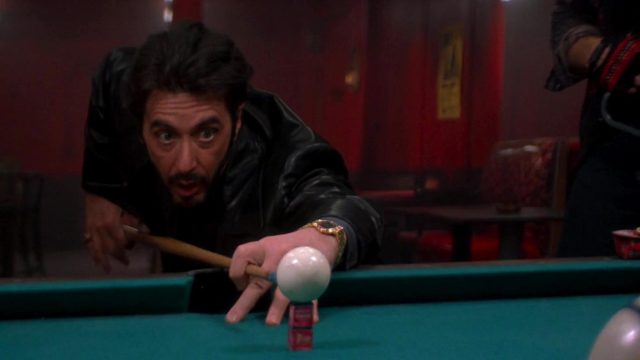This Week We’ve Racked Up:
- a middle-aged movie
- a middle-aged music genre
- a new cartoon
- a literary legend
- cheating!
Thanks to scb0212 for sinking articles into our pocket this week. Send articles throughout the next week to ploughmanplods [at] gmail, post articles from the past week below for discussion, and Have a Happy Friday!
At Fanfare, Rafiq Hilton speaks of Carlito’s Way at 30 years old:
Based on two novels by former Judge Edwin Torres (After Hours and Carlito’s Way) the story allowed De Palma this time to explore the consequences of excess and ambition for the big-time drug dealer. The movie plays out more like a classic film noir than it does a gritty gangster flick, despite containing its fair share of punch-ups, shootouts, drug-taking and sex. Yet this film is defined more by the jeopardy of Carlito’s situation than gratuitous violence. On the brink of being consumed by the world he wishes to escape, Carlito’s story is powerfully engaging and full of edgy tension, trapped as he is in a predicament largely of his own making. The combination of a morally reprehensible past tempered by a remorseful present is pure noir anti-hero and is the essence of what invests the audience into his character so well.
Sam Adams takes to Slate for a book-to-movie comparison of Nomona:
Radical adaptations are often the best ones, so it’s not Nimona’s lack of fidelity that makes it underwhelming. It’s that the movie’s writers threw out almost the entirety of their source material only to replace it with a prefabricated plot that subsumes the specificity of Stevenson’s story into a generic parable of teenage difference, complete with the requisite DreamWorks-esque pop-culture references. (It’s one thing to create a world in which quasi-medieval knights also watch zombie movies, another to throw in pandering gags about curly fries and subway musicians playing “Careless Whisper.”) The graphic novel is lumpy and oddly structured—the final 3 of 11 chapters occupy fully half the book—but part of what makes it engrossing is how hard it is to know what’s coming next. The movie takes gay and trans-coded characters and slots them into a story we’ve seen a million times before, about misunderstood “monsters” and fear of the Other, and that makes the details of their sexual orientations and gender identities seem almost beside the point. Like Pixar’s Elemental, Nimona seems to proceed from the assumption that focusing on diverse protagonists relieves the movie of the need to train its creative energies on any other area.
For The Ringer, Mark Hofmeyer breaks down the biggest cheating scandals in sports movie history:
Angels in the Outfield is the only movie on this list in which the players don’t know that they’re cheating. Sure, strange things are clearly afoot: An angel-aided Matthew McConaughey pulls off his second-best movie leap ever (Reign of Fire is no. 1), and there’s the infield hit involving Adrien Brody that causes 17 errors. But the only person who can see the angels is Roger, and people understandably have a hard time believing that he’s seeing spiritual beings and instead think he’s just a good-luck charm or some wunderkind with pre-Moneyball analytical skills. […] The ’94 California Angels were cheaters. But there’s definitely some gray area when it comes to divine intervention.
Julian Lucas profiles the visionary writer Samuel R. Delany for The New Yorker:
Friends call him Chip, a nickname he gave himself at summer camp, in the eleventh year of a life that has defied convention and prejudice. He is a sci-fi child prodigy who never flamed out; a genre best-seller widely recognized as a great literary stylist; a dysgraphic college dropout who once headed the Department of Comparative Literature at the University of Massachusetts, Amherst; and an outspokenly promiscuous gay man who survived the aids crisis and has found love, three times, in committed, non-monogamous relationships. A story like Delany’s isn’t supposed to be possible in our society—and that, nearly as much as the gift of his writing, is his glory.
The Atlantic‘s Xochitl Gonzalez writes about hip-hop’s current “mid-life crisis” on the 25th anniversary of Sean Combs’ first White Party:
Would frat boys ever have rapped along to Kanye West without the White Party? Would tech bros have bought $1,000 bottles of $40 liquor and drunkenly belted out the lyrics to “Empire State of Mind”? Would Drake have headlined worldwide tours? Would midwestern housewives be posting TikToks of themselves disinfecting countertops to Cardi B songs? It’s hard to imagine that a single party (featuring a Mister Softee truck) could redefine who gets to be a bona fide global pop star but, by all accounts, Puffy was no ordinary host.

